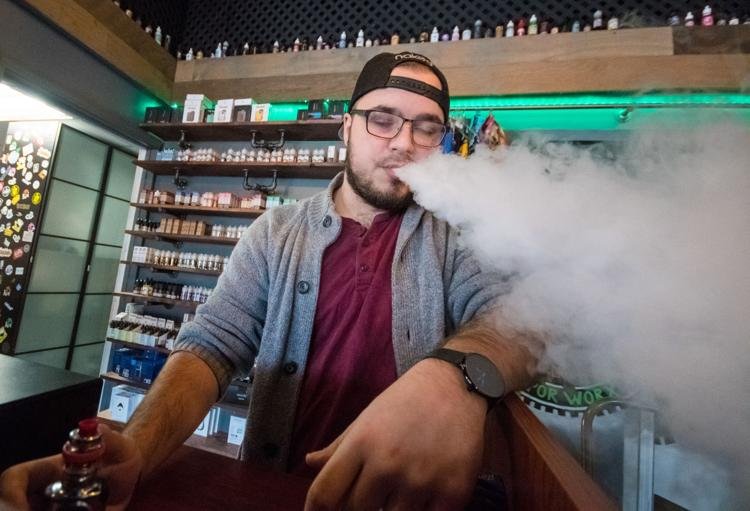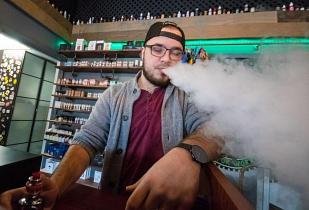State targeting vaping sales to minors
HARRISBURG — Minors who attempt to buy vaping products or get caught with e-cigarettes at school could face criminal charges under legislation that passed the state House unanimously Monday.
It’s already illegal, under federal law, for stores to sell vaping products to minors.
Pennsylvania state law allows police to charge minors for trying to buy tobacco products or bringing them to school, but state law doesn’t yet cover vaping products.
That means under existing law, while there are state and local inspections to crack down on tobacco sales to minors, those inspections don’t include checking whether stores are selling vaping products to juveniles, said Nate Wardle, a state Department of Health spokesman.
That policy would change if House Bill 97 passes the Senate and is signed into law by Gov. Tom Wolf, Wardle said.
“If state law would bar the sale of vaping to minors, then we would include that in our inspections,” he said.
A minor caught trying to purchase tobacco products can be fined between $100-$250 for the first offense. Youth caught with tobacco products at school can be fined $50.
House Bill 97 would update the law to treat vaping products — including those that don’t include nicotine — the same as tobacco products.
The measure passed the state House unanimously last session but died in the Senate judiciary committee. The new chairwoman of that committee, Sen. Lisa Baker, R-Luzerne County, has sponsored almost identical legislation and a committee vote on the Senate version of the vaping bill is scheduled for Wednesday.
“The intent is the same” in both the Senate and House anti-vaping bills, said Andrew Seder, a Baker spokesman.
“Reversing the dramatic teenage use rates requires efforts on multiple fronts,” Baker said in a memo seeking support for Senate Bill 396, which was introduced March 11. “While the FDA recently published new tobacco sales rules, our state law should reflect the reality of sales history and strive to curb exposure to minors.”
House Bill 97 “would complement” the federal law, said state Rep. Kathy Rapp, R-Warren County, the author of the legislation, in an interview earlier this month.
She was inspired to take up the issue after a store selling vaping products opened in Warren and a member of her staff researched the health concerns about youth vaping use, Rapp said.
“I’m not out to criminalize our youth,” she said.
The FDA also conducts enforcement targeting sale of tobacco products to youth. Last year, the agency did 4,039 inspections of Pennsylvania retailers. In 490 cases, retailers were accused of selling tobacco products to minors. The FDA inspectors recorded just 69 cases in 2018 in which Pennsylvania stores were allegedly caught selling vaping products to youth, according to government records.
The state conducted three times as many tobacco enforcement inspections in Pennsylvania last year as the FDA did and busted stores for selling tobacco to minors four times as often, according to data provided by the Department of Health.
There were 11,932 state tobacco enforcement inspections, including 2,071 that involved allegations that the store sold tobacco to minors, Wardle said.
The legislation is supported by the Pennsylvania School Board Association, said Annette Stevenson, a spokeswoman for the group.
Schools can ban vaping use without the state law, she said. But House Bill 97 would provide “clear authority” which could be applied “consistently” across the state, she said.
The legislation has been opposed by the American Lung Association for penalizing youth instead of focusing on doing a better job preventing stores from selling to minors. The group has suggested a better solution would be to increase the minimum age to buy vaping products and tobacco products to 21.
Six states already require that people must be 21 to buy tobacco products – California, Hawaii, Maine, Massachusetts, New Jersey and Oregon, according to the advocacy group Tobacco Free Kids. Virginia is scheduled to become the seventh on July 1.
Juul, the largest manufacturer of vaping products, said the company would support legislation to increase the legal age for buying vaping products to 21, said Ted Kwong, a spokesman for the company.
“Tobacco 21 laws have been shown to dramatically reduce youth smoking rates, which is why we strongly support raising the minimum purchase age for all tobacco products, including vaping products like JUUL, to 21 in Pennsylvania,” Kwong said. The Juul website already requires that customers must be 21 to make purchases, he said.
The American Lung Association pointed to studies finding that youth who use e-cigarettes are four times more likely to try traditional cigarettes than other youths.
In addition to the anti-vaping bill, the Senate judiciary committee is also scheduled to vote on Senate Bill 473, which raise the age to purchase tobacco products to 21, Seder said.
E-cigarettes typically heat a flavored nicotine solution into an inhalable vapor. While federal law bans their sale to those under 18, 1 in 5 high school students report using e-cigarettes, according to a December survey released by the University of Michigan’s Institute for Social Research. Only 7 percent of 12th-graders reported smoking cigarettes, according to that survey.
Comments
There are 0 comments on this post






